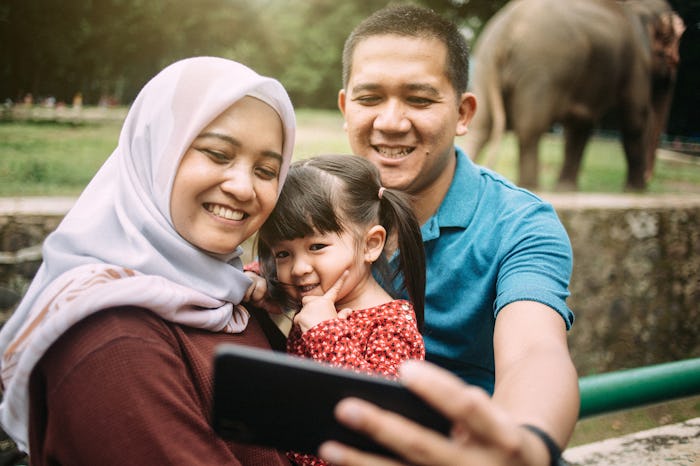Life

Are Zoos Safe To Visit Now? Experts Explain The Risks & Benefits
As the weather warms up and COVID-19 precautions start to relax, the U.S. is seeing more businesses, theme parks, and outdoor spaces reopening in time for summer. Zoos are part of this, but is it safe to go to the zoo right now? While it seems safe enough to be outdoors as long as you mask up and keep your distance from others, what does an actual doctor think?
Peily Soong, M.D., pediatrician at Children’s of Alabama, tells Romper in an interview that he thinks it is safe — as long as you’re being mindful. “Zoos are mostly outdoors and there’s usually not a whole lot of interaction with other people or objects, not a lot of touching, just walking around enjoying the park and the day and seeing the animals,” says Soong. “I think for, the most part, zoos are pretty safe. I know a lot of the zoos have closed off some of the enclosed and indoor parts of the zoo, and those would be a little riskier. As long as you’re practicing social distancing from the people around you, that could be a safe area as well.”
The Centers for Disease Control and Prevention (CDC) says it’s OK to visit outdoor parks, trails, and beaches to stay active and get out of the house safely. But, when you go, they do have recommendations to follow, and they’re good to keep in mind at the zoo, as well:
- Visit one close to home so you don’t have to stop for food, gas, or bathroom breaks, which could increase your chance of exposure.
- Stay 6 feet away from anyone you don’t live with.
- Wear a mask.
- Wash or sanitize your hands often throughout your visit, especially before you eat.
- Avoid communal areas, like playgrounds at the zoo, that have a lot of surfaces to disinfect and can make it tough to social distance.
"Everything you do adds a layer of protection: hand washing, face coverings, staying 6 feet away from other people, being outside instead of inside, and staying home if you are sick," says Jessica Cataldi, M.D., pediatric infectious disease specialist at Children's Hospital Colorado, in an interview with Romper. "None of these are complete guarantees on their own; it's about combining those strategies to decrease your risk of infection as much as possible."
Soong agrees with the CDC’s recommendation of staying off playgrounds under certain circumstances. As always, common sense will tell your parental spidey senses whether it’s safe or not.
“With playgrounds, there’s more touching of equipment and kids in packs and so forth, so we want to be aware of that if the zoos have those open. I think a lot of them are being more cautious and not opening up those areas to start with, but if it looks crowded, I would probably not have your kids play. If there’s only one or two kids and yours aren’t going to interact with those kids in close proximity, just wash their hands or use hand sanitizer after they’ve been playing on it.”
The CDC says kids under 2 years of age shouldn't wear masks or face coverings. So, what should parents do about masking up their littlest loved ones to visit the zoo?
“They’re fine to go without a mask, mostly because we’re looking at being outdoors,” Soong said. “They can enjoy being outside there, and we know the virus doesn’t spread nearly as well outdoors as it does indoors. If kids can’t keep their mask on and just fiddle with it, they’re touching their face more, so they’re better off not wearing a mask if they’re constantly touching their face. For zoos, I think it’s perfectly fine as long as you keep them socially distanced from other people.”
Many zoos have hand-washing stations at exhibits where you can touch animals, so make use of those throughout your visit. Zoos around the country are also updating their websites with info about their hand-sanitizing stations, what attractions are available (outdoor exhibits) and which are closed (rides, indoor exhibits, and theaters), and other details about how they’ll protect you from virus exposure. Be sure to check your zoo’s website and social media platforms before your visit if you have any questions.
"If people want to go to the zoo, I would encourage them to read about what the zoo is doing first," said Cataldi. "Are they limiting the number of people allowed in throughout the day to decrease crowds? Do they ask guests and employees about symptoms and tell people to stay home if they're sick? Are people required to wear face coverings? If the zoo is taking these precautions, and you as a family are taking your own precautions, then a few hours spent outdoors at the zoo may be a nice activity that is lower risk than other things."
Don’t forget: if your zoo is still closed or you’d prefer to avoid an in-person visit for now, you can always check out live feeds of animals in zoos and see what they’re up to from the comfort of your home.
Experts:
Peily Soong, M.D., pediatrician at Children’s of Alabama
Jessica Cataldi, M.D., pediatric infectious disease specialist, Children's Hospital Colorado
This article was originally published on